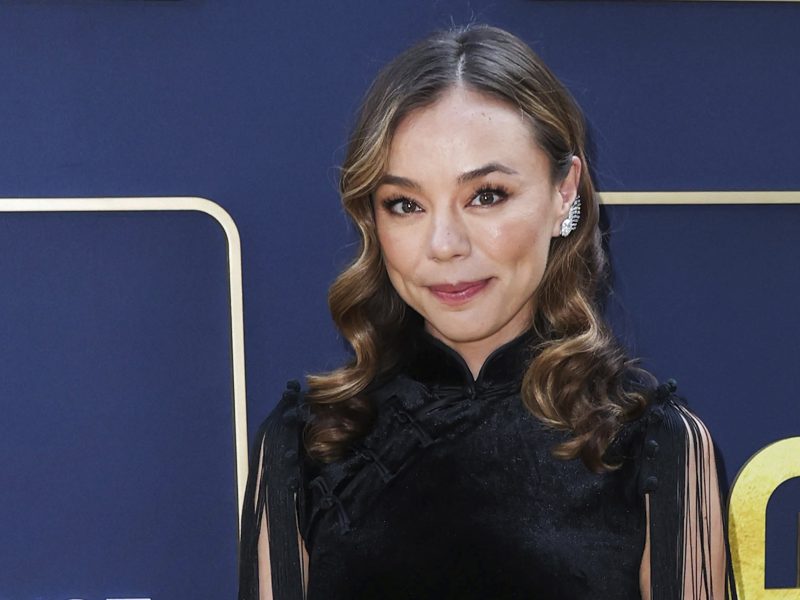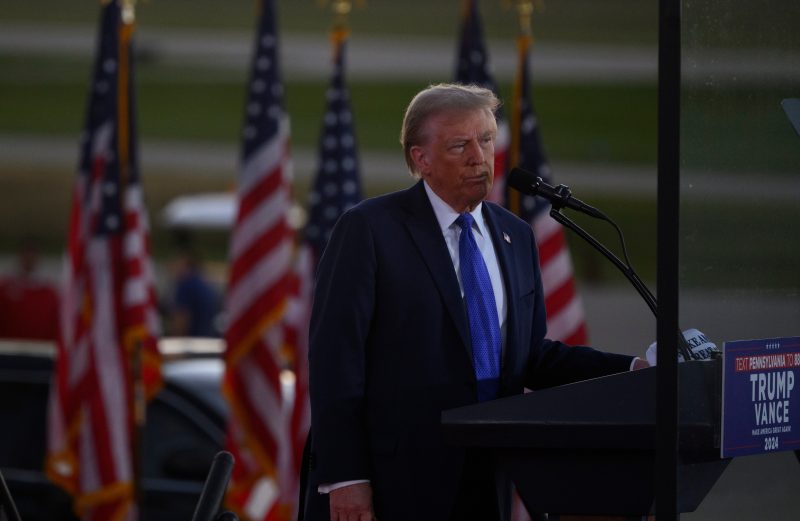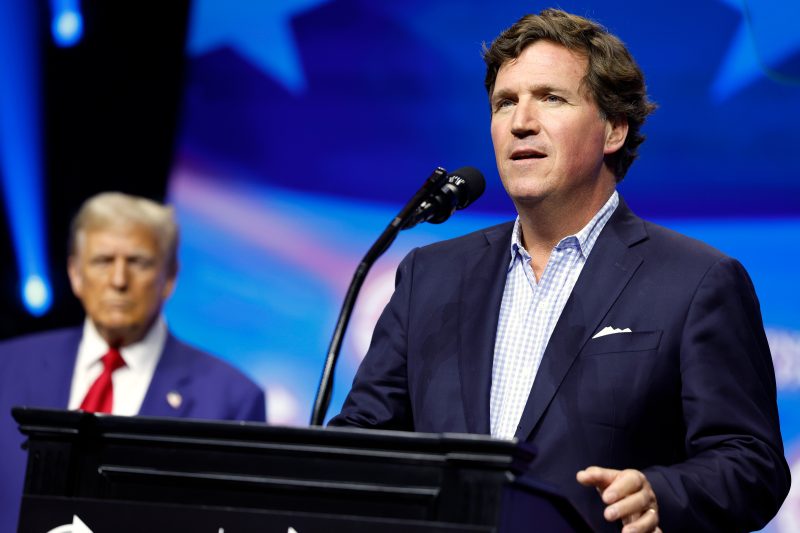
Who is Nicole Shanahan, Robert F. Kennedy Jr.’s pick for running mate?
Robert F. Kennedy Jr., who is running for president as an independent candidate, chose Bay Area tech lawyer and megadonor Nicole Shanahan as his running mate. Kennedy made the announcement Tuesday in Shanahan’s hometown of Oakland, Calif.
In making the announcement, Kennedy said he was looking for someone who shared his “passion for wholesome, healthy foods, chemical-free for regenerative agriculture, for good soils.” He said he was also looking for someone who has a “deep inside knowledge of how big tech uses AI to manipulate the public,” and someone with “strong ideas about how to reverse dire threats to democracy and our freedoms.”
Kennedy said that Shanahan, like him, grew disillusioned with the government and the Democratic Party.
“Our values didn’t change, but the Democratic Party did,” he said.
A political newcomer, Shanahan donated to Kennedy’s campaign and the super PAC supporting his bid — including $4 million she told the New York Times went to help pay for the commercial that American Values 2024 ran for him during the Super Bowl. She has never held elected office but has deep roots in the tech world and, according to Federal Election Commission filings, previously donated to Democratic campaigns.
As she introduced herself to a crowd of Kennedy supporters on Tuesday, Shanahan admitted that as “recently as a year ago, I didn’t think much of Bobby Kennedy.”
“I didn’t think much of him, because I didn’t know much. All I had was the mainstream media narrative,” she said. “But then a friend pulled me aside one day and said, ‘Nicole, please, do me a favor. Just listen to one interview with Bobby Kennedy. Just one.’”
Shanahan said it was his “commitment to peace and to the welfare of hard-working people in America that drew me, as a person of compassion, to his candidacy.”
“I saw a person of intelligence, of compassion, and of reason,” she said. “I saw a fellow lawyer who had committed himself to finding the truth and fighting for the environment and for people. I discovered a person who speaks out on issues that, even though they are critically important to human health and welfare, are consistently ignored by our government. And for the first time in a long time, I felt hope for our democracy.”
Shanahan, at the rally, officially renounced her membership in the Democratic Party, saying she grew disillusioned with it because it has “lost its way.”
Here’s what you need to know about Shanahan as she joins Kennedy to challenge former president Donald Trump and President Biden in November.
Shanahan, 38, was born in Oakland to a Chinese immigrant mother and a father who suffered from mental illness. In an essay published by People last year, Shanahan wrote that she, as a child, learned that “bad things happen, injustice happens, but there are always tools for overcoming them, it’s a matter of relentless commitment to oneself. I will never stop seeking self-actualization for myself, my family, and for the communities I serve.”
In an interview with Puck published in 2022, Shanahan said her mother came to the United States through family sponsorship and worked as a maid to make ends meet. Shanahan has said that she grew up on welfare, and she told Puck that she “never felt poor” growing up “because I believed the safety nets we had in the ’90s were actually quite good. I lived off them.”
“I survived off them, and dare I say I felt I had the opportunity to thrive,” she said.
Per her LinkedIn page, she received her bachelor’s degree from the University of Puget Sound and her law degree from Santa Clara University.
From 2018 to 2023, Shanahan was married to Google co-founder Sergey Brin. The two share a daughter.
Last year, Shanahan “committed” to her partner, Jacob Strumwasser, who formerly worked on Wall Street and is now an adviser at a bitcoin engineering firm.
In the essay for People, Shanahan said she spends most of her time “working for climate solutions, social justice, and women’s reproductive science,” as well as focusing on autism research.
“About two years ago our daughter was diagnosed with autism, and by virtue of that diagnosis I have a new cause to focus attention on (as has been typical of my experiences, I rarely seek out causes to support, they find me),” she wrote in the essay. “… I’ve been working with researchers to understand the variations in autism, the biological markers that might help us diagnose autism earlier, and even what causes autism. It is amazing what we’re learning, and we are already seeing overlaps with the work occurring in reproductive longevity, climate, and social justice.”
Shanahan founded the Bia-Echo Foundation, whose stated goal, according to its website, is to invest in “changemakers” who are “tackling some of the world’s greatest challenges … Reproductive Longevity & Equality, Criminal Justice Reform and a Healthy and Livable Planet.”
Shanahan told Puck in 2022 that her focus on reproductive longevity came from personal experience.
“A lived experience that so many women have in this world today,” she said. “Which is, late 20s, early 30s, entering what should be the beginning of the prime of your career, and feeling an early form of death. You’re losing something. Imagine going blind or losing the ability to hear. This is the ability to do something so fundamental to the human experience, to have a baby, to be a mother, to start a family.”
Shanahan said that she was trying to freeze embryos but that medical conditions made her realize that she wasn’t “actually able to successfully go through a full IVF round.”
“At the age of, at that point, 30, I believed I wasn’t going to be able to have children,” she said. “And I then felt that it was my responsibility to help other women in similar situations feel more empowered. Because I felt so helpless.”
Shanahan also said she grew concerned over the future of Roe v. Wade after Justice Ruth Bader Ginsburg, who died in 2020, did not step down from the Supreme Court during the Obama administration, and that made her realize working on reproductive longevity “was going to be that much more important in a world where Roe didn’t exist.”
“Seeing such a great division in this country … I think the division is so unfortunate, because at the end of the day, I think we all agree that life is precious, so precious,” she told Puck. “And I think the narrative of pro-life versus pro-choice is just not the right one for today. The one for today is: Let’s use technology as a connector to bring us together, and not divide us.”
Shanahan has said that the “execution” of Dobbs v. Jackson Women’s Health Organization — the Supreme Court decision that ended Roe — “is enraging.”
“I think that how we evolve past this moment is something that we don’t understand yet as a community, on either side of the aisle,” she said. “But we must evolve, and I think that science helps us evolve … I think we can bridge this empathy gap that gets us to a place where we evolve to something even better than Roe.”
Before turning to philanthropy, Shanahan founded ClearAccessIP, a company that used AI to help owners of intellectual assets develop and manage their technology. Shanahan also served as a fellow at the Stanford Center for Legal Informatics where, according to the program’s website, she “launched the Smart Prosecution project, a multi-disciplinary effort applying data science to the prosecutorial process.”
Shanahan donated $25,000 to the joint fundraising effort between Biden’s 2020 campaign and the Democratic Party, per FEC filings. Shanahan also contributed to the campaigns of Democrats Marianne Williamson and Pete Buttigieg in that election cycle before backing Biden.
During the rally Tuesday, Shanahan officially left the Democratic Party and encouraged other disillusioned members of the party to join her and Kennedy in their campaign.
“The Democratic Party is supposed to be the party of compassion and peace, it is supposed to be the party of diplomacy and science,” she said. “While I know those ideals still abide within many Democrats, I want to point out that the party has lost its way. In its leadership, in its institutions, it has become interested in elitism, celebrity and winning at all costs, even if that means turning a blind eye on issues they all know to be true.
“I know because I’ve been in those circles for the last eight years, and I have grown increasingly tired of it,” she added. “It wasn’t until I met Bobby and the people supporting him that I felt any hope in the outcome of this election.”
She also made an appeal to Republicans who are at odds with their party, saying she has “seen conservative voters with new eyes too.”
“I have met hunters and farmers that are some of the staunchest conservationists I have ever known, who understand ecosystems better than most,” she said. “I have met mothers protecting their children who are searching every possible avenue for their health. And yet the Republican Party, like the Democratic, is letting them down because the actions of the party are diverting from the values that actually support individual freedom.”
Shanahan’s newsiest campaign donation came in the shape of a 30-second Super Bowl ad. The ad, sponsored by the super PAC supporting Kennedy’s bid, re-created a vintage political ad used to promote John F. Kennedy’s 1960 presidential campaign and recast it in support of his nephew’s independent 2024 campaign — and drew condemnation from several members of the Kennedy family. The New York Times reported that Shanahan was a “major source” of the funding and creative guidance behind the $4 million ad. In an interview with the Times, Shanahan said that she wanted to highlight that Kennedy is running for president, and that she was motivated by her concerns over the environment, vaccines and children’s health.
“I do wonder about vaccine injuries,” she told the Times, clarifying that she is “not an anti-vaxxer” but wanted more screening of risks for vaccinations. “I think there needs to be a space to have these conversations.”



